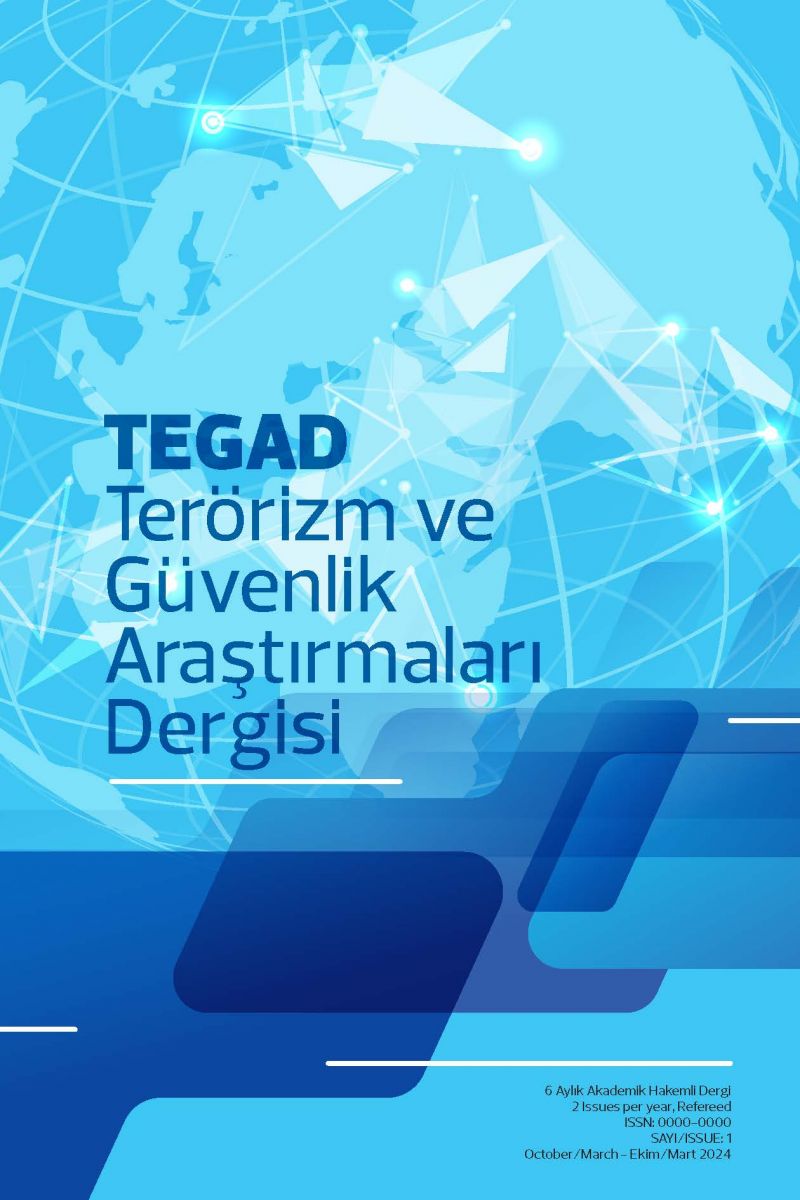Araştırma Makalesi | Açık Erişim
Terörizm ve Güvenlik Araştırmaları Dergisi 2025, Clt. 2(1) 1-14
A Constructivist Approach to the Roles of Haganah, Irgun, and Lehi in the Establishment of Israel
ss. 1 - 14 | DOI: https://doi.org/10.29329/tegad.2025.1301.1
Yayın Tarihi: Mart 31, 2025 | Görüntüleme Sayısı: 201/96 | İndirilme Sayısı: 278/124
Özet
The purpose of this study is to examine the role of Haganah, Irgun, and Lehi terrorist organizations in the establishment of Israel from 1920 to 1948 by applying constructivist theory. The contribution of these terrorist organizations to the formation process of the State of Israel is multifaceted. They undertook important tasks in weakening the British mandate, taking precautions and retaliation against Arab attacks, protecting Jewish settlements, and creating a suitable environment for immigration. In particular, radical terrorist activities organized by the Irgun and Lehi terrorist organizations furthered and deepened the process of establishing Israel. The results of the actions carried out by Haganah, Irgun, and Lehi terrorist organizations weakened the British mandate, created a military infrastructure for the war of independence, and provided material and nonmaterial support for the establishment of the State of Israel. The security policies and types of violence implemented by the terrorist organizations during the construction of the State of Israel are closely related to security and terrorism activities. This study hypothesizes that the roles played by the Haganah, Irgun, and Lehi terrorist organizations in the establishment of Israel were one of the main driving forces that shaped the fundamental elements, such as military infrastructure, ideological orientation, and political transformation, and significantly accelerated the establishment process of the State of Israel.
Anahtar kelimeler: The Haganah, Irgun, and Lehi Terrorist Organizations, Establishment of Israel, Zionism, Terrorism, Constructivism.
APA 7th edition
CELEBI, E. (2025). A Constructivist Approach to the Roles of Haganah, Irgun, and Lehi in the Establishment of Israel. Terörizm ve Güvenlik Araştırmaları Dergisi, 2(1), 1-14. https://doi.org/10.29329/tegad.2025.1301.1
Harvard
CELEBI, E. (2025). A Constructivist Approach to the Roles of Haganah, Irgun, and Lehi in the Establishment of Israel. Terörizm ve Güvenlik Araştırmaları Dergisi, 2(1), pp. 1-14.
Chicago 16th edition
CELEBI, Enes (2025). "A Constructivist Approach to the Roles of Haganah, Irgun, and Lehi in the Establishment of Israel". Terörizm ve Güvenlik Araştırmaları Dergisi 2 (1):1-14. https://doi.org/10.29329/tegad.2025.1301.1
Alkhader, M. (2015). Hagana ve Irgun terör örgütleri ve Israil’in kuruluşundaki rolleri (Yüksek Lisans Tezi). Polis Akademisi Güvenlik Birimleri Enstitüsü, Ankara.
Anderson, C. (2021). When Palestinians Became Human Shields: Counterinsurgency, Racialization, and the Great Revolt (1936–1939). Comparative Studies in Society and History, 63(3), 625–654. https://doi.org/10.1017/S0010417521000219
Asal, C. (2018). İsrail’in kuruluşunda Revizyonist Siyonizm ve Irgun örgütü (Yüksek Lisans Tezi). Marmara Üniversitesi.
Balpınar, Z. (2016). Savaşan ulus yaratma anlayışısında bir yapı taşı: İsrail’in Gadna Programı. Journal of International Social Research, 9(43), 581–597.
Bar-Or, A. (1996). The Evolution of the Army’s Role in Israeli Strategic Planning: A Documentary Record. Israel Studies, 1(2), 98–128.
Bauer, Y. (1966). From cooperation to resistance: Haganah 1938–1946. Middle Eastern Studies, 2(3), 182–210. https://doi.org/10.1080/00263206608700044
Cevik, A. (2021). Savaşın Gölgesinde Bir İnsanlık Dramı: Struma Vakası. Journal of Current Debates in Social Sciences, 4(1), 24–32. https://doi.org/10.37154/cudes.2021.29
Cohen, M. J. (1973). Appeasement in the Middle East: The British White Paper on Palestine, May 1939. The Historical Journal, 16(3), 571–596.
Couture, A. (2013). Menachem Begin’s Irgun and Zionist Revisionism: 1944–1948 (B.A. Thesis). University of Wisconsin.
Creveld, M. V. (2002). The Sword and The Olive: A Critical History of the Israeli Defense Force (1st ed.). Public Affairs. E-book.
Demirtaş, B. (2014). İnşacılık. In Ş. Kardaş & A. Balcı (Eds.), Uluslararası ilişkilere giriş: tarih, teori, kavram ve konular (pp. 167–187). Küre Yayınları.
Duran, M. A. (2021). Filistin’de Yaşanan Arap-Yahudi Çatışmaları Özelinde Peel Komisyonu Kararları ve Arapların Türkiye’den Beklentileri (1929–1939). Filistin Araştırmaları Dergisi, 10, 57–80. https://doi.org/10.34230/fiad.1023362
Gavish, D. (2005). A Survey of Palestine under the British Mandate, 1920–1948. Routledge.
Halperin, L. (2015). Origins and Evolution of Zionism. Foreign Policy Research Institute.
Hassan, S. S. (2001). Zionism and terror: The creation of the state of Israel. Proceedings of the Indian History Congress, 62, 866–872.
Heller, J. (1995). The Stern Gang: Ideology, politics, and terror, 1940–1949. Frank Cass.
Hoffman, B. (2020). The bombing of The King David Hotel, July 1946. Small Wars & Insurgencies, 31(3), 594–611. https://doi.org/10.1080/09592318.2020.1726575
Husan, S. (2014). The Zionist project and the British mandate in Palestine. Proceedings of the Indian History Congress, 75, 967–974.
Kasalak, K. (2016). The British Policy towards Palestine and The Mandate for Palestine. Süleyman Demirel University Institute of Social Sciences Journal, 2016(3), 65–78.
Menachem Begin. Retrieved May 26, 2024, from https://www.jewishvirtuallibrary.org/menachembegin
Robert, B., & Erlich, R. (2016). Conversations with terrorists (First edition). Routledge. (Original work published 2010), pp. 41–55.
Sağlam, M. (2023). Oppression and Violence by Jews in Palestine under The British Mandate (1920–1948). Abant Sosyal Bilimler Dergisi, 23(3), 1664–1679. https://doi.org/10.11616/asbi.1328384
Shaviṭ, Y., & Shaviṭ, Y. (1988). Jabotinsky and the Revisionist movement: 1925–1948. Middle Eastern Studies, 29(2), 355–357.
Shpiro, S. (2013). The Intellectual Foundations of Jewish National Terrorism: Avraham Stern and Lehi. Terrorism and Political Violence, 25(4), 606–620. https://doi.org/10.1080/09546553.2013.814502
Tal, D. (2004). Between Intuition and Professionalism: Israeli Military Leadership during the 1948 Palestine War. The Journal of Military History, 68(3), 885–909. https://doi.org/10.1353/jmh.2004.0147
The Role of Jewish Defense Organizations in Palestine (1903–1948). Retrieved from https://www.jewishvirtuallibrary.org/the-role-of-jewish-defense-organizations-in-palestine-1903-1948
Van Tonder, G. (2019). Irgun: Revisionist Zionism. 1931–1948. Pen & Sword Military. E-book.
Wendt, A. (1992). Anarchy Is What States Make of It: The Social Construction of Power Politics. International Organization, 46(2), 391–425.
Wendt, A. (1999). Social Theory of International Politics. Cambridge: Cambridge University Press. https://doi.org/10.1017/CBO9780511612183
Zadka, S. (1996). Propaganda and Guerrilla: The case of the Jewish armed struggle against the British in Palestine. Revue Européenne des Études Hébraïques, 1, 100–116.
Sheffer, G. (1973). Intentions and results of the British policy in Palestine: Passfield’s White Paper. Middle Eastern Studies, 9(1), 43–60. https://doi.org/10.1080/00263207308700227
